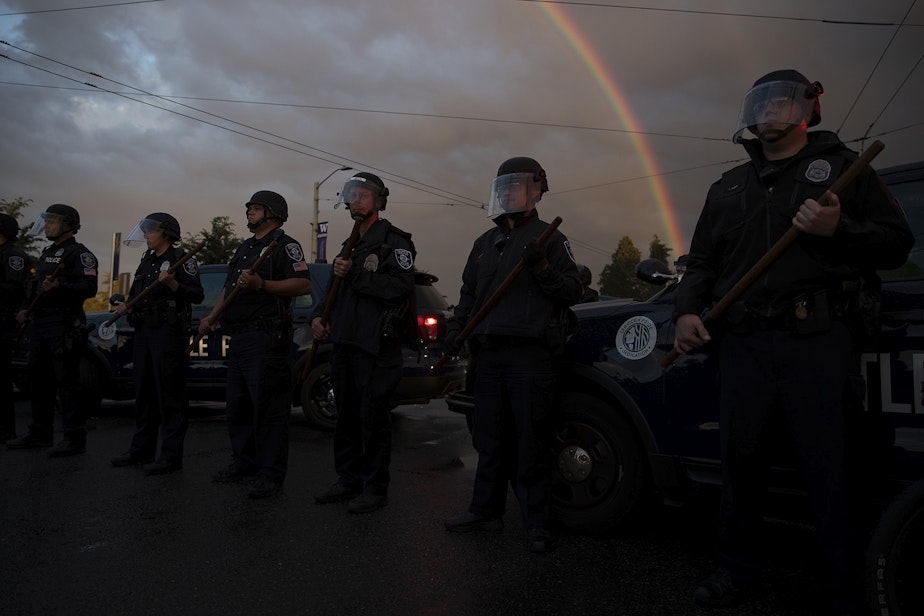Washington state revamps police deadly force investigations

New rules are coming for independent investigations when police use deadly force in Washington state.
They require more power for civilians, and more help for families of the slain person during the investigative process.
The Washington State Criminal Justice Training Commission will vote Thursday on the new rules, which have been developed over months of sometimes difficult meetings among stakeholders.
Independent investigations are required under Initiative 940, which voters approved in 2018. Previously, some larger agencies like the Seattle Police Department performed their own criminal investigations when an officer used deadly force.
The new rules call for regional law enforcement teams to take over those criminal investigations. And the rules say each investigative team must also include two civilian “community members” who will help choose the law enforcement members on the team and examine any potential conflicts of interest.
Steve Strachan, the executive director of the Washington Association of Sheriffs and Police Chiefs, said this level of civilian involvement is unprecedented.
“I’m not aware of any other state that has done this. This is truly groundbreaking,” he said. “The civilian review folks would be involved in vetting, reviewing the qualifications, the conflicts and the actual individuals that are assigned to the team, and then they’re able to provide input.”
Sponsored
Strachan said he thinks the new process will result in more public trust.
“While law enforcement groups have raised issues about implementation,” he said, “I think a lot of people agree that the goals [are] transparency for the community and sort of ‘showing our work.’”
Sponsored
But organizations representing law enforcement officers say the new rules go too far. The Washington Council of Police and Sheriffs says these rules constitute “regulatory overreach” that violates collective bargaining laws.
“At issue for WACOPS is the rule’s extensive mandates regarding how the uninvolved investigating team is selected and trained as well as the new mandate to include at least two untrained civilians on every investigative team,” the group said in a statement.
But the group also said it is “proud of the relationships built” with De-Escalate Washington and other stakeholders in the wake of I-940.
The ballot measure changed the standard for charging police officers with misuse of deadly force and required the state to implement new law enforcement training on de-escalation and first aid.
CJTC Commissioner and Tukwila City Councilmember De'Sean Quinn said, “I-940 forced us all in the same room and I think we are better for it.” He said he supports the new rules, which he thinks are suited to law enforcement agencies of different sizes and budgets.
Sponsored
“I feel strongly it’s appropriate to add [community members] to keep us all together and communicating, because when we aren’t, that’s when it gets contentious,” he said.
The new rules also aim to keep family members better informed when their relative dies in a police encounter.
Rose Johnson’s son, Ryan Matthew Smith, was shot by Seattle police responding to a domestic violence call last May.
“He was shot 12 times, six seconds after they kicked down his door. No one called me. The medical examiner called me like 20 hours later,” Johnson said.
Sponsored
“It’s just really sad to me that we’re human beings, yet we don’t treat each other like human beings. Like no one in that police department thought, 'Oh, maybe one of us should call his mother,'" she said. "They had my information.”
Smith’s girlfriend told the operator he was armed with a knife. He was later determined to be severely intoxicated.
Johnson said because she’s in California, it’s been especially difficult to get information from SPD and bring attention to his case.
“I think at a bare minimum there should just be some change in the way we the families are treated after the situation,” Johnson said.
“Everybody’s really cold and stoic. I’m reaching out to them, I’m calling them, they’re not reaching out to me. It’s already a horrific tragic situation and you feel alone already. You feel like no one cares on the side of Seattle.”
Sponsored
The new rules require that family members be notified “as soon as they can be located,” by the involved agency or the independent team, “whichever is faster.”
They also require that a member of the investigative team “be assigned as a family liaison within the first 24 hours and keep the family, or a representative of the family's choice, apprised of all significant developments in the independent investigation and … give the family and the involved agency advance notice of all scheduled press releases.”
Sponsored
Laura Wells is the “citizen at large” on the state Criminal Justice Training Commission, which is developing the new rules.
“These rules talk a lot about communication,” she said. “I hope it will help ramp down some of the hysteria and misinformation that can arise after there’s been a use of force incident.”
Wells, Quinn and fellow commissioner and Kennewick Police Chief Ken Hohenberg are also supporting an additional resolution to audit these independent investigations and collect data on the use of deadly force by law enforcement.
They also support legislation to add another citizen at large position to the CJTC board.
Quinn and Wells are currently the only two members of the 14-member commission with no ties to prosecutors or law enforcement. Wells wants a citizen member from each side of the state.
“My vision is that those two ‘citizens at large’ will be the link between the commission and the community members that are on these independent investigation teams,” Wells said.
“I strongly believe both of those seats should be filled by people from communities that have traditionally not had collaborative relationships with the police.”




